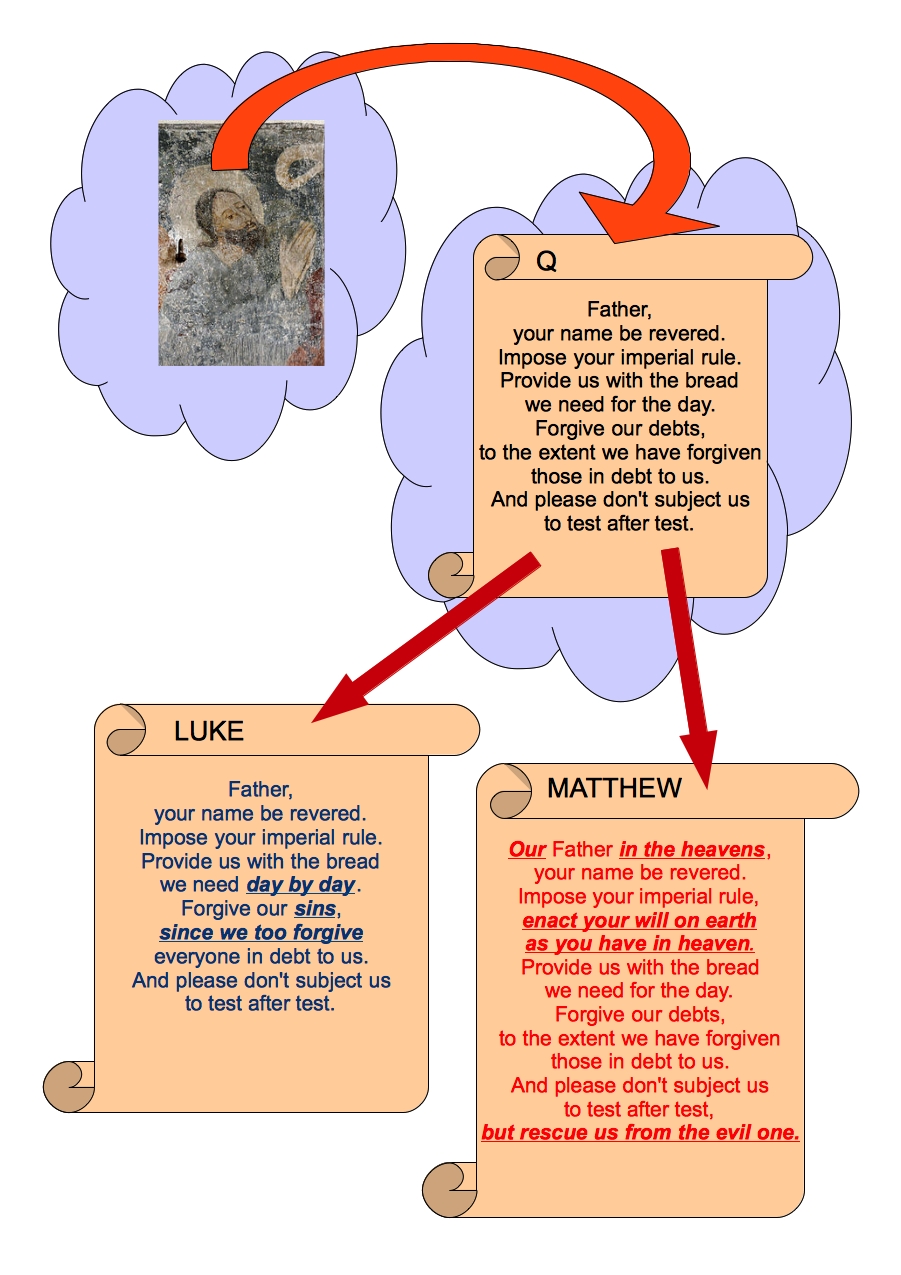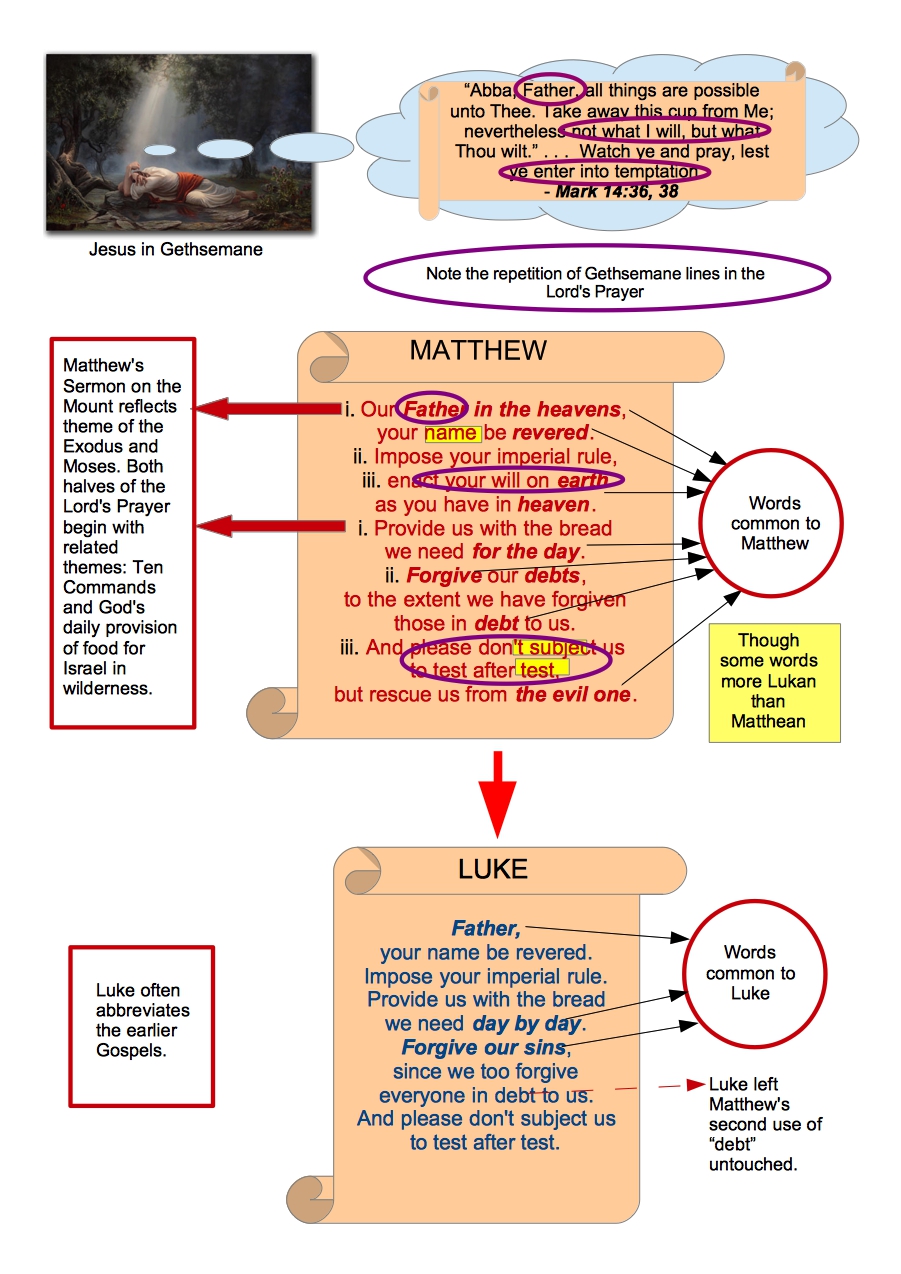I compare here two explanations for the origin of the Lord’s Prayer as we read it today in the Gospels of Matthew (6:9-13) and Luke (11:2-4).
There are in fact more than two explanations to be found in the scholarly literature but they can be conveniently divided into two: those that trace the prayer back to Jesus by means of various oral traditions and/or the now lost Q document or different editions/versions of Q on the one hand and those that explain the prayer as primarily the creation of the author of the Gospel of Matthew on the other. (If we dispense with the Q channel for the Lord’s Prayer and rely upon varied and pervasive traditions that Jesus tended to pray somewhat along these lines (that bypassed Q) then we raise the question of why the author of Mark’s gospel — and John’s — appeared to be unaware of it.)
For the first (that the prayer derives from Jesus, most likely as a collation of common themes in prayers he prayed over many different times) I use the explanations published by Funk, Hoover and the Jesus Seminar in The Five Gospels. Though not agreed upon by all scholars in the details I think it does give a fair introduction to the general idea of how our canonical versions may have been adapted from the original teachings of Jesus. As for the second explanation (that the prayer was fundamentally the creative composition by one we shall call “Matthew”) I rely upon Michael Goulder’s ‘The Composition of the Lord’s Prayer’ (JTS 14 [1963], pp. 32-45)*.
Goulder also conceded that the original prayer came from Jesus but not as a direct instruction; he suggested that our Lord’s Prayer evolved from Jesus’ Gethsemane prayer for deliverance from the crucifixion. We will see that the details of his argument leave very little of the prayer that was not the creative work of an evangelist.
The following diagram shows what can reasonably be divined (an oxymoron appropriate to theological discussions) as the prayer from which both Matthew and Luke adapted their respective versions. Note the following:
- Luke’s “day by day” is considered a departure from what Jesus would probably have originally said. Matthew got it right and Luke started to express worries about the day after this day and the next. This argument is based on our “knowing” that Jesus himself lived with complete trust in God for the needs of the present day (only).
- We “know” Jesus would have been directly mixing with people who faced dire poverty and were at the mercy of those who had money. It follows that Jesus originally prayed about real money debts. Matthew got this right, keeping to the original prayer as he would have found it, while Luke changed it to spiritual debts (sins).
- On the other hand, Luke is generally said to have preserved the original saying of Jesus (as recorded in Q) that hews to the world of material possessions (e.g. Blessed are the poor) while Matthew is the one who changes the original by spiritualising it (e.g. Blessed are the poor in spirit.) We need to keep in mind that we are dealing with the arguments of theologians and not historians or logicians.)
- Matthew liked a bit of eloquent rhetoric so he added additional high-sounding phrases and clauses to the original. The last line is a typically Matthean antithetical addition (i. don’t do this -[but]- ii. do do that)
Here is an alternative:
The arguments are more nuanced and qualified than I have depicted here. See online pages 53 to 55 of Mark Goodacre’s Goulder and the Gospels for a critical analysis of one aspect of Goulder’s argument. One can also read online a fuller explanation by Goulder himself: pages 298-301 of Midrash and Lection in Matthew. I have attempted to hint at some of the qualification by highlighting with yellow some words in Matthew’s prayer that Goodacre identifies as more typically Lukan than Matthean.
Goulder argues that Matthew has been inspired by Mark’s prayer of Jesus in Gethsemane to compose a more formal prayer for church use. He has created a stylistic piece of literature in two halves, each with three petitions. (Matthew likes his clumps of “three’s” as we see from reading the remainder of the Sermon on the Mount: alms, prayer, fasting; ask, seek, knock. . . )
As for words common to Matthew, do a word search for “heavenly Father” in the Gospel online. “Revered” above is an alternative translation for the word more commonly recognised as the archaic “hallowed”. Matthew also likes his earth/heaven dichotomy. He also likes to use financial debt as a metaphor for sin.
Luke on the other hand is fond of using “Father,” (comma), as a form of address. His use of “debt” does not, however, really fit with his earlier use of “sins”. It appears that he has inadvertently taken over Matthew’s word at this point.
Luke certainly at times chooses to greatly abbreviate episodes in Mark’s gospel. Mark writes at length about the death of John the Baptist and uses about fifteen verses to tell us of the miraculous feeding of the 5,000. Luke only mentions the former in passing and the latter in a mere eight verses (Luke 9).
Matthew’s prayer might be thought to extend the author’s theme that compares Jesus with Moses and his Sermon on the Mount with Moses giving the law in the wake of the Exodus. Contrary to one argument of the Jesus Seminar mentioned earlier, however, Goulder is definite that Matthew’s use of the word “this day” means “tomorrow” and that Luke has in fact extended the spirit of Matthew’s allusion by asking God to provide for his petitioners just as he once provided for Israel day after day in the wilderness. So we see that some arguments that appear to see into the author’s mind are not always stable and can be used very much like “irregular verbs” as they suit.
So,– here we have, in overview, two competing explanations for the origin of the Lord’s Prayer. Did Matthew and Luke independently adapted it from an earlier document or traditions? Or did Matthew decide to make it up after reading in the Gospel of Mark about Jesus’ prayer in Gethsemane?
.
.
* That’s not quite true. It would cost me $38 (US) to gain access to Goulder’s 1963 article so I rely upon Goulder’s main points that he discusses in his memoirs, Five Stones and a Sling, in his earlier work, Midrash and Lection in Matthew, and Mark Goodacre’s critique of the original article in Goulder and the Gospels: Examination of a New Paradigm.
If you enjoyed this post, please consider donating to Vridar. Thanks!



Possible non-Q inspirations for the author:
Our Father which art in heaven,
Deuteronomy 32:6 “Is not he your father, who created you,”
Hallowed be thy name.
Ezekiel 36:23 I will sanctify my great name.
Thy kingdom come,
Micah 4:8 the former dominion shall come
Thy will be done in earth, as it is in heaven.
Sirach 28:2 Forgive your neighbor the wrong he has done, and then your sins will be pardoned when you pray.
And lead us not into temptation,
Psalm 59:2 Deliver me from those who work evil
Psalm 71:4 Rescue me, O my God, from the hand of the wicked, from the grasp of the unjust and cruel.
but deliver us from evil
Phrase not found in Greek manuscripts. Some suggest it came from a Jewish morning prayer.
For thine is the kingdom, and the power, and the glory, for ever. Amen.
1 Chronicles 29:11 Yours, O Lord, are the greatness, the power, the glory, the victory, and the majesty; for all that is in the heavens and on the earth is yours; yours is the kingdom, O Lord, and you are exalted as head above all.
My eye got lost in the middle on the word “Psalm”.
Thy will be done in earth, as it is in heaven.
Psalm 143:10 Teach me to do your will, for you are my God.
Matthew Give us this day our daily bread.
Luke Give us day by day our daily bread.
Proverbs 30:8 feed me with the food that I need,
Matthew And forgive us our debts, as we forgive our debtors.
Luke And forgive us our sins; for we also forgive every one that is indebted to us.
Sirach 28:2 Forgive your neighbor the wrong he has done, and then your sins will be pardoned when you pray.
Yes, I like this. Along with some of Gould’s observations, I would add the theologies pointed out by Bart Ehrman and Albert Schweitzer – Jesus the prophet of the apocalyptic merger of the heavenly kingdom of God that overwhelms the earth (especially Matthew, less so John).
Thy kingdom come,
Thy will be done in earth, as it is in heaven.
Most of the rest of the prayer as well as an appeal to the father is an invocation to the faithful to prepare for the imminent apocalypse “to get their act together” by attending to one’s debts, dealing with personal temptation, etc.
This doesn’t really solve the problem any because it would basically be a “Q” anyway, but what does the literature say regarding the Didache, which has the text of the Lord’s prayer almost identical to that of Matthew?
// It follows that Jesus originally prayed about real money debts. //
I had read a few months ago (I forget where, though this book preview might be it) that it is common in the DSS Hebrew for “debt” to be viewed as a debt to God in the same sense that one person can owe a financial debt to another person. If that’s true, and I don’t know whether it is or not, then I don’t think it follows that Jesus was talking about “real money debts” in the earliest version of the prayer, but rather, the opposite.
One final comment is that I would argue that the Lord’s Prayer is an interpolation in Matthew, given the way it breaks up the literary pattern of the text surrounding it.
Anyway, thoughts?
To clarify on my last comment, “sin” would be viewed as a debt to God, instead of as a burden you carry
A very kind soul has forwarded to me a copy of Michael Goulder’s original 1963 article on the Lord’s Prayer. Some of the points raised in comments here may be addressed when I post again with the greater detail of that article.
A year or two back, I thought that I read a claim that the Lord’s Prayer already existed, almost verbatim, in Jewish literature, somewhere, before these gospels were written. I take it I got this wrong?
Interesting. The following seem to relate to what you once read:
Wikipedia — Relation to Jewish Prayer
and
The Jewish Encyclopedia — The Lord’s Prayer
Many thanks Neil, they were enlightening, I think my source may have been here,
http://www.jesusneverexisted.com/surfeit.htm